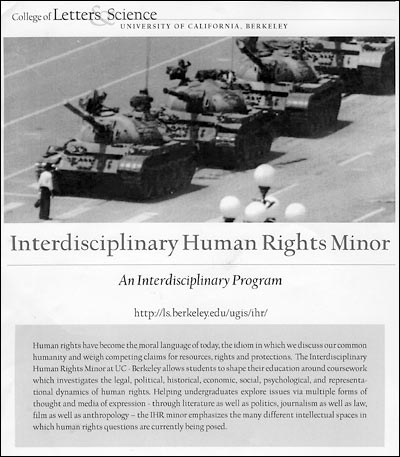Students stage mock trial to engage in international law, human rights
Students in the political science course "Accountability for International Human Rights Violations" reenact high-profile, international trials and act as prosecutors, defense and judges. In their most recent trial, former Secretary of Defense Donald Rumsfeld faced charges of extradition to France to be tried there for violating international torture laws.
December 2, 2010
In a small classroom in Barrows Hall last Tuesday, former Secretary of Defense Donald Rumsfeld faced charges of extradition to France to be tried there for violating international torture laws. Students in the political science course “Accountability for International Human Rights Violations” acted as the defense, prosecution. and presiding judges.

Flier advertising the new interdisciplinary human-rights minor
The students’ mock trial was a component of the course that was offered for the first time this fall semester as part of the campus’s newly-created interdisciplinary minor in human rights. Taught by Professor Helene Silverberg, the class reviews the principles and theories of accountability and applies them to historical hearings and trials.
“We focus on mechanisms of accountability, including the institutions that have been created to enact justice, and on defining exactly what justice is,” Silverberg said. During the semester, students recreate three high-profile trials, applying what they have learned throughout the course.
The cases covered are broad in terms of geographic scope and international violations. Along with the Rumsfeld hearing, students also tackled the extradition of the late Chilean army general Augusto Pinochet and former Serbian general Ratko Mladic, who faces charges of genocide.
The original high-profile extradition case was filed in 2007 and appealed in 2008, but it was dismissed in both instances.
During Rumsfeld’s UC Berkeley trial, students took the roles of the prime minister of France, who presented the argument for extradition, and of two U.S. attorneys representing Rumsfeld’s defense. Arguments were presented by both parties, and time was provided for rebuttal and counter-argument.
Kristy Kumar, a third-year political science major, was the prime minister. She said the presentations are a valuable part of the course because they allow students to engage more analytically in the process of international law. “By acting out the possible application of universal jurisdiction, I was able to apply many of the conceptual theories and frameworks we have learned in class into a realistic setting,” Kumar said.
Each student argued his or her side with passion and determination, even if it did not coincide with popular opinion. Kumar said that hearing differing opinions is the best part. She enjoyed seeing her classmates’ reactions when she rebutted their claims with her own evidence, she said.
After the presentations, two judges delivered their verdict. In a surprise twist, one voted for extradition, while the other voted against it. This left the door open for an appeal by Rumsfeld, for whom no one played the part.
Third-year political science and developmental studies major Marion Krieger was the judge who voted against extradition. “I enjoyed presenting an opposing judgment,” she said. “It showed that human rights concepts are not as cut and dry as people might think and instead need to be shown and looked at out of different perspectives.”
Finally, Silverberg went around the classroom and asked other students if they had any questions for the presenting participants and what verdict they would have delivered after hearing the case. The majority of the students voted to extradite Rumsfeld, but a few went the opposite direction — a reflection of how convincing both sides’ arguments were.
Silverberg said the students did a fantastic job on their presentations. “They were enthusiastic, thoughtful and provocative,” she said. “The presentations encourage students to really engage with the material and see human rights issues from multiple perspectives.”
Silverberg hopes courses like this will attract students to the new human rights minor from many academic disciplines, such as the humanities and engineering.
“The link to human rights is hugely integrated into other disciplines,” she said. The goal, she added, is to broaden outreach to undergraduates in parts of the campus that wouldn’t immediately see a link.
The course will be offered every fall semester. For more information on this course and other courses in the major, visit the Human Rights minor website.